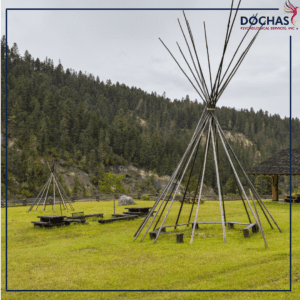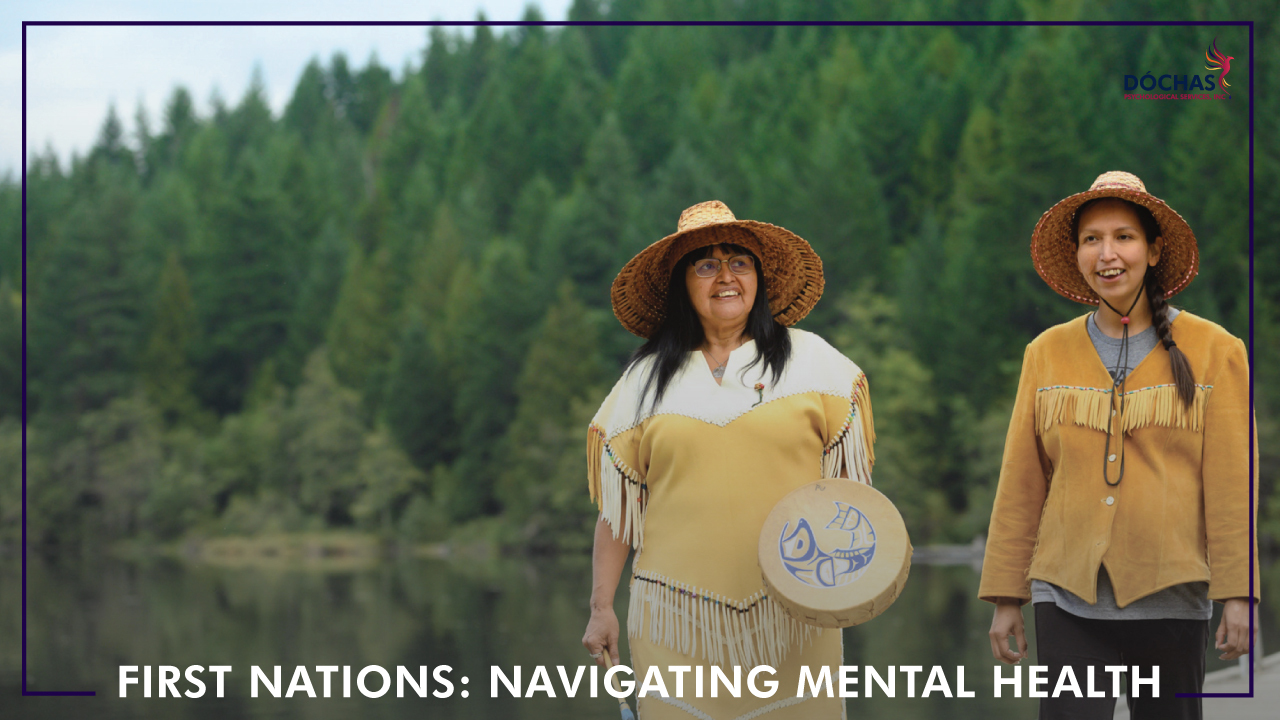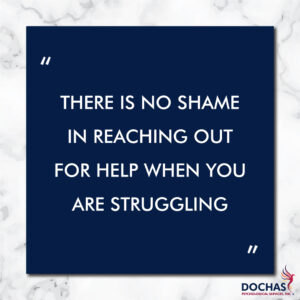Mental health isn’t experienced the same way by everyone, and it certainly isn’t experienced the same way by groups that have historically experienced generational trauma and stressors. Welcome back to the Dóchas blog—today it’s Melanie here and I’d like to talk about the specific experience of First Nations and mental health. After consultation and research, I came up with these strategies to try, if you are a First Nations person who may be navigating your mental health and the fallout from what your community has experienced. This blog is not meant to be a quick fix, but having a few options of strategies to try can be a help to guide you through your mental health experience.
 First, let’s talk about the background that affects the experience of First Nations’ mental health. Historically, the First Nations community has experienced trauma that was committed by an outgroup in a purposeful and destructive manner, which resulted in high levels of communal stress and negative generational outcomes (see Bombay et al., 2014, for the research background on this). Experiences such as residential schools and racial stereotyping affected not just the single person who experienced it, but communities through the generations. Some of these negative results are worsened by stressors in current everyday life, and actually accumulate through generations. These conditions are what the Canadian residential school survivors and their families are facing.
First, let’s talk about the background that affects the experience of First Nations’ mental health. Historically, the First Nations community has experienced trauma that was committed by an outgroup in a purposeful and destructive manner, which resulted in high levels of communal stress and negative generational outcomes (see Bombay et al., 2014, for the research background on this). Experiences such as residential schools and racial stereotyping affected not just the single person who experienced it, but communities through the generations. Some of these negative results are worsened by stressors in current everyday life, and actually accumulate through generations. These conditions are what the Canadian residential school survivors and their families are facing.
The generational trauma of Canadian residential schools can include effects such as suicidal thoughts and attempts, greater rates of depression & substance abuse, greater risk of struggling with mental health, and poorer educational outcomes. And these effects can be cumulative.
There are no quick solutions for the effect of this kind of trauma, but there are some strategies you can try out which you may find to be beneficial for your mental health. Take what seems like it may be useful for you from the suggestions below:
Mental Health Strategies To Try
Learning about yourself and your culture and developing pride in both
By learning about your culture and becoming active in your community, you can develop a sense of pride. Reaching out to family and elders and attending powwows or other events that promote your culture can be ways to build this pride.
Engaging in healthy activities that you enjoy (cultural or not!)
If cultural activities are something you enjoy, lean into activities like craft-making, dancing and singing. But healthy activities don’t have to be cultural—just getting out in nature or being active in some other way can be great to give you a feeling of mental wellness. Participate in activities that make you feel good.
Investing in healthy relationships (they take work!)
A major part of our mental health is our connections with other people. Focusing on connecting or reconnecting with friends and family, or on meeting new friends with similar experiences or backgrounds, can go a long way to supporting our mental health.
Developing healthy strategies to deal with life’s stressors
It seems we never get away from stress in life. Having a plan ahead of time to manage these stresses when they arise can go a long way to improve the experience of these stressful times. Some ideas might be to consult with elders or other mental health professionals who are familiar or trained to work with the First Nations community when facing a stressor. Or learn about self-care and self-help through books, talking with others, or the internet.
Setting personal goals and initiating steps to reach set goals.
Setting goals is helpful for giving our life a sense of direction, and in turn for improving how we feel about our lives. It can be helpful to talk with an elder or other mental health professional for assistance and guidance on what goals to set for yourself. There are also many great online resources that give tips on how to set goals.
When to Reach Out…
Having some strategies to cope with mental health struggles can help you feel more confident, but sometimes your mental health experience can be more than what you can cope with on your own. At times like these, it is important to recognize when to reach out for an extra helping hand. There is no shame in reaching out for help when you are struggling.
Some signs to help you recognize when you may need to reach out for some extra help:
- When experiencing a loss of interest in activities you previously enjoyed
- Wanting to work on relationships
- Wanting to understand your cultural identity
- Feeling triggered and disadvantaged by systemic oppression
- When experiencing self-harm or suicidal thoughts or behaviours
- Feeling like you need to speak with someone
- Feeling distressed or experiencing strong emotional reactions
- Feeling triggered by painful memories or recent events
- Increased drug or alcohol use
- Struggling with grief
- Struggling with thoughts or feelings that are causing you concern
It’s okay to ask for help, and there are resources out there for people struggling with exactly these kinds of feelings. You don’t have to manage these experiences on your own.
 Resources for Those Struggling…
Resources for Those Struggling…
911: In the case of emergency and when needing immediate medical attention or help such suicidal thoughts or plans.
Dóchas Psychological services: 780-446-0300 OR info@dochaspsych.com
- Dóchas has many therapists with different areas of specialization and life experience.
Hope for Wellness Help Line: 1-855-242-3310 OR www.hopeforwellness.ca
- 24/7
- Counselling & crisis intervention
- Cree, Ojibway, and Inuktitut speaking counselling available on request
I hope some of these strategies in this discussion of First Nations and mental health will be helpful to you in your personal experience. Reach out to us here at Dóchas Psychological Services if you have any questions or concerns.
References
Bombay, A., Matheson, K., & Anisman, H. (2014). The intergenerational effects of Indian Residential Schools: implications for the concept of historical trauma. Transcultural psychiatry, 51(3), 320–338. https://doi.org/10.1177/1363461513503380
About Dóchas Psychological
Dóchas Psychological Services is a well-established and trusted therapy clinic located in Spruce Grove, Alberta. At Dóchas we value the idea that everyone deserves a safe space. Through connection and education, our team works hard to build a trustworthy relationship with each of our clients. It is our goal to create a community for our clients to feel like they belong.
Disclaimer
Information provided through Dóchas Psychological Services blogs or vlogs is meant for educational purposes only. They are NOT medical or mental health advice. You can read more about our disclaimer here.


 Resources for Those Struggling…
Resources for Those Struggling…





